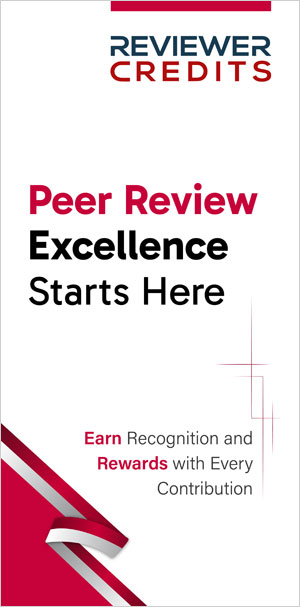Comments
Asst. Prof. Dr. Ali H. Wheeb
14 July, 2025Good explanation about the peer review process. But in my opinion, because reviewer spent a lot of time improving the quality of the paper and did not receive feedback.
Dr. Joseph Davies
14 July, 2025Peer reviewing is a process of mirroring one's understanding of a subject matter in shaping somebody else's work for a better understanding of the target, otherwise known as the reading audience. Therefore, having several peer reviewers to review an article could mean that mirroring different shades of opinions on the quality of the article. However, the most important aspect of the art of peer reviewing is following best practice, especially ethical considerations. Therefore, Dr. Haseeb's contribution is very relevant and an eye-opener and a reflection of the expectations of quality peer reviewing.
Abdosh Nuru
14 July, 2025Dr. Haseeb ifranullah, thanks for your great contribution in this science editor council. I am excited to see this unwavering partnership of you. I want to comrade with you in science . Thanks for all
Iman Elahi
14 July, 2025
Dear Dr. Irfanullah,
Thank you for your insightful article. I especially appreciated your point about collaborative peer review (co-review) it’s an excellent idea. Not only does it enhance the quality of review reports through shared expertise, but it also creates valuable learning opportunities for early-career researchers. Promoting this approach can lead to more balanced, thorough, and fair peer evaluations.
With kind regards.
Iman Elahi
Prof. Dr. Francisco Bulnes
14 July, 2025Peer review is a fundamental part of the review process in the strictly academic sense, because academic peers are, in theory, experts and individuals with high qualifications and qualities (recognized in their field, expertise, and ethics) who review an article for a specific journal. In most reputable journals, the article is submitted for review in a blind process where the name, university, and country of the submitting author are omitted.
Abdul Syahid
14 July, 2025
Thank you for this thoughtful and timely piece. I really appreciated how you didn’t just list best practices, but challenged us to think critically about their real-world impact, especially in under-resourced publishing contexts.
Your points on the challenges of finding reviewers, the tension between speed and quality, and the editor-author dynamic felt especially relatable. I also found your reflections on reviewer recognition and co-review thoughtful, with a healthy dose of realism.
Most of all, I value your call to humanize the peer review process, balancing standards with empathy, and ideals with context. Thank you for sparking such an important conversation.
Dikran Toroser
14 July, 2025Thank you for this valuable blog—a thoughtful exploration of the many complex considerations that shape peer review. Peer review is certain to evolve—ideally by considering feedback such as this and also from the broader community. While thorough review can take time, it is reassuring that mechanisms now exist to expedite publication when urgency is required, as well as alternative avenues for rapid sharing. As connectivity increases, confidentiality will remain vital for some review models. This analysis by Dr. Irfanullah is super insightful, especially regarding the ongoing debate about payment for peer review; it is essential to consider multiple perspectives here, particularly the concerns about conflicts of interest that some organizations have when compensation is involved. Thank you for the insightful suggestions!
Getachew Mihret
14 July, 2025
Thank you for sharing the thought-provoking blog post by Dr. Haseeb Md. Irfanullah titled “Are Good Practices in Peer Review Really Good?” I appreciate the opportunity to reflect on such a relevant and timely topic within the scholarly publishing community.
Dr. Irfanullah’s insightful analysis challenges conventional assumptions about the peer review process and invites us to reconsider what we often accept as “best practices.” His arguments regarding context-specific approaches, the sometimes rigid application of peer review norms, and the overlooked nuances of power dynamics and inclusivity are especially compelling.
As a researcher and academic, I found the discussion both refreshing and necessary. It resonates with my own experiences, particularly within the context of research cultures in the Global South, where a more adaptable and reflexive peer review model could significantly enhance scholarly communication.
I commend the Editors’ Café and the ACSE Advisory Board for fostering such meaningful conversations. I look forward to more contributions that encourage critical thinking and collective improvement in academic publishing.
Faaiz Ali Shah
14 July, 2025
Being Peer Reviewer for 24 national/international IF Biomedical Journals and reviewed more 980 Orthopaedic manuscripts over a decade..I am more concerned and anxious about the quality of manuscript under review than writing my own manuscript.
Haseeb did an excellent analysis of peer review process.We must struggle to eliminate flwas from peer review process.Peer Review should be for Acadamician by Academician and for Academician.
14 July, 2025
Can't agree with you more, Mr. Shah: We must work together to remove the shortcomings of the current peer review system.
Dr Ameha Tefera Tessema
14 July, 2025
Thanks! For Timely and elegant article concerning peer-reviewer. Peer-reviewing is time and energy consuming process inorder to say yes or no of the nobility, problem solvent and an addition to the existing
Litrature.
while reviewing the research article the reviewer should look into not only the research stature but should also look into the materiality of the title inorder to have elegant research paper to be published. Since many decorative article have been seeing publishing with nothing valuability on top journals , many elegant papers and highly problem solving papers rejected by many top journals. So inorder to have better ,applicable and publishable paper, the peer-reviewers should be paid according to Thier comments since many journals seeks to receive positive comments,recognized and should to have most likely relevant knowledge according thier research publications.
14 July, 2025
Thank you for your valuable comment, Dr. Tessema. While peer reviewer an important role to play, I think editors need to play more active role in journals to ensure some of the challenges you noted above, e.g., published paper lacking novelty, while apparently high value papers are getting rejected. Indeed we need to see a balanced role is played between editors and reviewers.
Aniela Pinto Kempka
14 July, 2025Thank you, Dr. Irfanullah, for this insightful and necessary reflection. The way you deconstruct widely accepted peer review practices through ethical and contextual lenses is both bold and refreshing. I especially appreciated the emphasis on local constraints, co-review dynamics, and the often-unspoken asymmetries in recognition and compensation. As a researcher and reviewer, I believe it is time we move beyond viewing peer review as a mere gatekeeping tool and reframe it as a space for constructive and equitable dialogue. Your reflections encourage this shift and are valuable for editors, reviewers, and authors alike. Grateful to Editor’s Café for providing a platform for these conversations.
14 July, 2025
Thank you so much Dr. Kempka, for your kind words. I am pleased to see some of my thoughts and perspectives resonate yours.
Prof. Dr. Maan Abdul Azeez Shafeeq
14 July, 2025Thank you, Dr. Haseeb, for this wonderful and distinguished article. The most important thing in peer review is choosing reliable and scientifically qualified reviewers, not exceeding 3 reviewers. The most important thing is the agreement of opinions and ideas between the reviewers, editors and authors of the research, and not putting too much pressure on the authors in terms of the opinions of the reviewers and being strict with the opinions of the reviewers, with the importance of rewarding the reviewers with financial returns to encourage them to review in a scientific and academic manner and transparently. It is difficult to integrate the opinions of all participants in the research with the reviewers, but as much as possible, the research is made scientifically sound and in line with the policies of the journal. I repeat my thanks once again to all those responsible for the integrity of the journal.
Dr. Aftab Alam Khan
14 July, 2025I think the good practices in peer review are truly effective, but are they just idealized standards? . While they aim to enhance fairness and rigor, practical challenges often limit their application. It's essential to evaluate not just the intent, but the real-world impact of these practices
Shabeeb Hussain
14 July, 2025
Thank you, Dr. Haseeb, for this thought-provoking piece. I particularly appreciate your critical take on co-reviewing—while it can support early-career researchers, without proper recognition, it risks reinforcing the unpaid labor model at the heart of peer review. Your reflections on the mismatch between global standards and local realities also resonate strongly. In resource-constrained contexts, editorial flexibility is often a necessity, not a flaw.
Recognizing reviewers through certificates, APC discounts, or visible acknowledgments could offer a middle ground where monetary compensation isn’t feasible. Rethinking peer review as a collaborative and context-aware process is indeed the way forward.
Dr Bello RS
14 July, 2025
I thank Dr Haseeb for this eye-opening article on the discussions around peer-review . As par the need and role of peer reviewers in article publication process,they are like facilitators whose relevance cannot be ignored.
However, the issues are around the competence of the reviewer, trust on reviews, reward systems and sentiments of the reviewer.
Competence: The editorial board have lost confidence in the review process when a single paper will be subject to over 5 reviewers giving different opinions. I will not accept a review of any article that have multiple reviewers. This does not show competence and professionalism. It undermines the integrity of the reviewer. Reviewers of any article should be maximum three.
Other issues are also critical to peer review and requires equal attention. The reward system should be across board, not country specific. International reviewers should also be renumerated both financially and otherwise to encourage reviewers.
14 July, 2025
Thank you for raising the competence and professionalism aspects in peer review, Dr. Bello. Indeed compensating international reviewers remain a challenge. Of course, a handful of journals are doing that for some time now.
MI Pasha
14 July, 2025A thoughtful critique of peer review practices. However, the challenges are well addressed; the piece could benefit from a deeper exploration of scalable solutions, especially for under-resourced journals adapting to digital and AI-driven systems.
14 July, 2025
Thank you Dr Pasha, for your comment. I would love to talk about some scalable solutions particularly using AI-driven system in a future piece. I am also sure, this year, we will be able to see a good number of discussions on these actionable issues given the theme of Peer Review Week (https://peerreviewweek.net/): "Rethinking Peer Review in the AI Era."
Clara Slone
14 July, 2025Thank you for raising some much-needed questions about peer review practices. Your viewpoint on reviewer compensation, co-reviewing, and the importance of context really stood out to me. We often overlook these issues, but they’re key to making peer review fair and sustainable. This piece is a great reminder that peer review isn’t one-size-fits-all, and it’s time we start adapting it to better serve both authors and reviewers.
14 July, 2025
Thank you Clara, especially for encouraging me to write my first, single-author piece for the Editors Cafe!
Maryam Sayab
14 July, 2025
The point about co-review potentially becoming a new layer of unpaid labor is especially striking. As we move toward more inclusive and transparent publishing ecosystems, we must ask not just how peer review functions, but who it serves—and at what cost. It’s good to see someone openly challenge the assumptions we often take for granted in academic publishing.
Curious to hear how others are grappling with these tensions in their own editorial roles.
Kristine Guo
14 July, 2025
Researchers are overwhelmed and being asked to review more papers than ever. So it's not surprising that many are now saying “no” to review invitations. Peer review is invisible labor so some compensations should be acted...Money might motivate some, but it could also attract people who rush through reviews just for the cash.
That said, not all rewards have to be monetary. Instead, We could offer public recognition, certificates, or even discounts on APCs or conference fees. Even something as simple as naming a “Top Reviewer” could make a big difference.
HIN LYHOUR
14 July, 2025This article is tremendously insightful because Dr. Haseeb summarizes key takeaways that are clear, short, and applicable. After reading it thoroughly, I started to think about some journals that I have worked for as a reviewer. Some have clear and straightforward regulations and guidelines, respecting the time and effort of the reviewers and recognizing their contributions by issuing certificates, but some do not. In this regard, I may also share this article and its main ideas with other researchers and publishers in my country to extract necessary points for real applications.
14 July, 2025
Thank you so much, Dr. Hin Lyhour. I am glad that you found some of my points useful. Feel free to share this article with your colleagues to continue the conversation.
Gharib Hafizov
14 July, 2025If I were the editor-in-chief, I would not ask someone to conduct an independent review of the manuscripts submitted to the journal, but would instruct the members of the editorial board to evaluate the scientific novelty, relevance, methodology, compliance with the requirements of the journal, the quality of the presentation of the material and compliance with ethical standards. I would choose 1-2 notables in each field for the editorial board of my journal and pay them royalties for each review.
14 July, 2025
I understand the model you have proposed above Dr. Hafizov, used to prevail in some (if not most) disciplines some time back. But the way we have now specialized our disciplines by splitting the old ones, have created so many journals, and the ever-increasing flow of manuscripts, it might be difficult for new journals to follow the model you have proposed. Another challenge probably is we have made the current peer-review model as a part of the global journal standard. So, journals not following that system will struggle to be indexed. Of course, some publishers are already challenging the prevailing review system with many different models. But can't say all are doing well in terms of being mainstreamed.
Dr. Sharif Mohd.
14 July, 2025
I sincerely thank Dr. Haseeb for this thought-provoking article on the peer-review process. Peer reviewers play a vital role in upholding academic quality, and their contributions should be valued.
In my experience, it’s discouraging when a manuscript is reviewed by multiple referees who offer conflicting feedback—only for the editor to reject it outright without giving the author a chance to respond. This raises concerns about the fairness and consistency of the review process. While reviewers’ insights are important, editorial decisions should also consider the author’s perspective to foster a more transparent and balanced approach.
Moreover, the current peer-review system often lacks fairness in how reviewers are recognized. Incentives, financial or otherwise, should be inclusive and globally standardized. Reviewers, regardless of their country, deserve equal acknowledgment for their time and effort. This would encourage greater participation and help strengthen the integrity of the entire scholarly ecosystem.
Dr. NAZIR Hussain
14 July, 2025The author of the article, Dr. Haseeb Irfanullah should be appreciated for providing valuable points and suggestions regarding the reviewers of articles/research papers during the publication process, while some readers and other stakeholders have shared their valuable viewpoints. The opinions of all the contributors are well-founded and based on their personal experiences. What needed is that publishers should read these and consider updating their policies on individual basis, depending on their prevailing conditions individually. However, they must publish their policies on the website of their journals. In my view, uniformity in this regard is not compulsory at all. Each journal may compensate its reviewers as it likes, but within the moral framework and laws of the publishing industry.
Dr. Sharif Mohd.
14 July, 2025
I sincerely thank Dr. Haseeb for this thought-provoking article on the peer-review process. Peer reviewers play a vital role in upholding academic quality, and their contributions should be valued.
In my experience, it’s discouraging when a manuscript is reviewed by multiple referees who offer conflicting feedback—only for the editor to reject it outright without giving the author a chance to respond. This raises concerns about the fairness and consistency of the review process. While reviewers’ insights are important, editorial decisions should also consider the author’s perspective to foster a more transparent and balanced approach.
Moreover, the current peer-review system often lacks fairness in how reviewers are recognized. Incentives, financial or otherwise, should be inclusive and globally standardized. Reviewers, regardless of their country, deserve equal acknowledgment for their time and effort. This would encourage greater participation and help strengthen the integrity of the entire scholarly ecosystem.
David Chibuike Ikwuka
15 July, 2025Thank you, Dr. Haseeb, for this interesting article on academic peer reviewing. This article has given us an overview of how peer review can be reimagined, not just as a systemic barrier but as a system built on trust, equity, and shared responsibility. As a senior academic, reviewer, and editor in the LMIC, I draw on these insights to advance ethical publishing culture, boost reviewer engagement, and advocate for more just, inclusive, and efficient scientific publishing.
Dr. G. M. Shamsul Kabir
15 July, 2025Very good. I appreciate all kinds of opinions an comments.
DR. MUHAMMAD MERAJ
15 July, 2025
Dr. Irfanullah has raised powerful and thought-provoking concerns about the peer review system, especially in the context of developing countries. His piece is an important contribution to a broader conversation about fairness, labor, and reform in scholarly publishing. This article could be a key reference point for academics, editors, and policymakers working toward a more ethical and equitable system of peer review.
This article is informative and engaging, but lacks empirical support, and theoretical framing. (I’d like to apologize in advance for my critique). Some of the pieces look to me are sweeping generalization, needing empirical backing such as “globally in almost all context, any payment to the reviewer is seen negatively (being editor of a journal, I love to send money to the reviewers as a token of love). Secondly his assertion that the usage of artificial intelligence in peer review may violate data protection laws, needs further elaboration because Data Protection Laws are not the universal one, but country specific.
My final critique is that; the blog ends somewhat abruptly after the final theme. There is no strong concluding synthesis that summarizes his position, offers recommendations, or depicts a way forward.
Georges Sardin
15 July, 2025
Peer reviewers systematically reject articles that could question their own publications and are also wary of accepting any critical articles on current official issues. However, they do accept articles that coincide with fashion speculations. Their valuations are often not free from bias, SO IT WOULD BE HELPFUL TO PONDER THEM WITH THE ASSESSMENTS OF SOME AI.
Dr. ALLAH BAKHSH GULSHAN
15 July, 2025
“Are Good Practices in Peer Review Really Good?"
The question of whether good practices in peer review are truly good is a complex and multifaceted issue. Here are some thought-provoking comments:
1. Contextual dependence: What constitutes "good" peer review practices may vary significantly depending on the field, journal, or specific manuscript. A one-size-fits-all approach may not be effective.
2. Bias and variability: Peer reviewers, like all humans, bring their own biases and perspectives to the review process. This can lead to variability in the quality and fairness of reviews.
3. The role of chance: The peer review process can be influenced by chance events, such as the selection of reviewers or the timing of submissions. This can impact the outcome of the review process.
4. The limitations of peer review: Peer review is not a foolproof system, and it has its limitations. It can be time-consuming, and reviewers may not always be experts in the specific area of research.
5. The need for ongoing evaluation: The effectiveness of peer review practices should be regularly evaluated and updated to ensure they remain relevant and effective.
6. The importance of transparency: Transparency in the peer review process can help build trust and credibility in the research. This includes making reviewer comments and decision-making processes more accessible.
7. The potential for innovation: New technologies and approaches, such as AI-powered review tools, may offer opportunities to improve the peer review process and make it more efficient and effective.
By considering above comments, researchers and journal editors can work to create a more effective and efficient peer review process that promotes high-quality research and fosters a culture of transparency and accountability.
Aderaw Tiruaynet Gessese
15 July, 2025Thank you for this insightful blog post—it offers a thoughtful and nuanced look at the various factors that influence peer review. The process is bound to continue evolving, ideally shaped by feedback like this and input from the wider community. While in-depth reviews can take time, it's encouraging to see that systems are in place to fast-track publication when needed, along with alternative platforms for rapid dissemination. As digital connectivity expands, maintaining confidentiality will continue to be crucial for certain review approaches. Dr. Irfanullah’s analysis stands out as particularly valuable, especially his discussion on the ongoing debate around compensating reviewers. It’s important to weigh different viewpoints on this topic, especially given concerns about potential conflicts of interest raised by some organizations. Thanks again for your thoughtful contributions!
Bashar F. Maaroof
15 July, 2025Peer review is an essential component of the academic review process, as academic peers are, ideally, knowledgeable experts with recognized qualifications and standards (in their area of expertise and ethical conduct) who evaluate a manuscript for a particular journal. In reputable journals, the submission undergoes a blind review process in which the name, institution, and country of the author are withheld.
Mona A. M. Abd El-Gawad
15 July, 2025Thank you so much Dr. Haseeb, for sharing this compelling valuable information.
Dr. Igbayilola Yusuff Dimeji
15 July, 2025
This isa succinctly captured piece. Peer review process should be transparent with objectivity.
Many reviewers rather than be object always play to the gallery and this brings review back and forth.
An instance is my recent article where I have the revise the article 7 times where the #2 reviewer continue to bring comments back and forth without due diligence until it got to a point where a wrong comments were sent to me and at this point, I have to called the attention of the Editor to it and that's when the article was finally revised, accepted and published.
Reviewers should not insist that every point raised must be addressed as he wants it. Just like the reviewers, most authors are also reviewers elsewhere and vice versa, there should be objective review for scientific success.
On the other hand, most editors are also in the habit of forming semi-god after an article is recommended for acceptance, you will some editors rejecting the article for filmsy excuses.
I see this as a wasted intellectual efforts of the reviewers and this has to stop.
Swati Chitranshi
15 July, 2025
The article by Haseeb Irfanullah prompts significant inquiries regarding the efficacy and equity of the peer-review process in scholarly publishing.
This article fosters a comprehensive conversation about the peer-review system, underscoring its difficulties and possible avenues for enhancement. Recognizing the shortcomings and biases inherent in peer review will enable us to strive for a fairer and more effective method of assessing academic research.
Dr.Bireshwar Bera
15 July, 2025
I had the opportunity to read the blog, and I must say that it raises some thought-provoking points about the peer review process that are worth reflecting on.
The discussion on whether widely accepted peer review practices truly serve their intended purpose is both timely and necessary. I particularly appreciated the critical lens through which Dr. Irfanullah examined the assumptions we often make about “good practices.” For instance, the emphasis on balancing transparency with confidentiality struck me as a crucial but often overlooked aspect of peer review. The article rightly highlights the need to adapt these practices to the evolving landscape of academic publishing, ensuring they remain both ethical and effective.
One suggestion I would add to the ongoing discussion is the importance of fostering a culture of mentorship within the peer review process. Encouraging experienced reviewers to guide early-career researchers could not only improve the quality of reviews but also help address the growing demand for qualified reviewers.
Dr. Mahesh Karale
15 July, 2025Insightful article on peer review! The peer review process plays a critical role in refining research articles and shaping scholarly work. Independent, third-party evaluation adds valuable credibility and helps ensure the rigor of the research. However, several challenges continue to affect its effectiveness—most notably, concerns surrounding reviewer competence, trustworthiness of the reviews, the lack of well-defined reward systems, and the influence of reviewer sentiments.
Dr. Nathier A. Ibrahim
15 July, 2025
Peer review in the field of research is a way to mitigate the risk of ethical violations. Reviewers accurately assess the extent to which studies adhere to approved ethical guidelines, but peer review faces challenges; among these obstacles are the lack of time for reviewers, the likelihood of bias, and the absence of uniformity in evaluation criteria. Balancing constructive criticism and supporting researchers while maintaining their anonymity is a delicate task; in addition, the huge growth of scientific literature poses logistical challenges for editors and reviewers. The approval of experienced peers means that the research has been thoroughly evaluated and meets the standards of the scientific community. This trust is vital, not only for the researchers themselves, but also for policymakers, educators, and the public who rely on scientific results to make informed decisions. I completely agree with what he said (Dr. Haseeb Md. Irfanullah) in his article.
With our utmost appreciation and consideration
Jeanne Alejo-Abitago
15 July, 2025Thank you for this timely article. I particularly appreciated the discussion on the challenges of finding reviewers, which resonates with my own experiences. Becoming involved in peer review means you have a fundamental role in safeguarding and upholding the integrity of knowledge. Peer review is indeed a cornerstone of scientific and academic integrity.
Zohreh Movahed
15 July, 2025
Thank you, Dr. Haseeb Irfanullah, for this thoughtful and timely article. It highlights important challenges in peer review, especially in finding qualified reviewers and maintaining fair editor-author communication. Recognizing reviewers beyond payment—through certificates or invitations—is vital to sustain their motivation. The ethical concerns around unpaid labor in co-reviewing also need attention. Finally, transparent and updated peer-review policies, including guidance on AI use, are essential for maintaining trust and quality in publishing. This article encourages all stakeholders to work together to improve peer review for the benefit of science and society.
Silas
16 July, 2025This is good practices to get feed back from any experianced reviewers.However in my self reviewing journals needs time and commitment therefore giving only certificate as credit is not satisfactory for this guys.It might be better for allowing to register the web of science(WOS) as well as even sometimes given as money for reward plus free training opportunity in known conferances concerning the review course discipline.Thanks!
Prof. Dr. Mridul Madhav Panditrao
16 July, 2025
An Interesting and very relevant thought process. It reflects the challenges faced by any active Editor in Chief of a quality-conscious, transparent and indexed journal, one of which I am. Especially, if the journal is dealing with Medical-related manuscripts, as I am. All the issues, mentioned by Prof. Haseeb, get exponentially multiplied.
At the outset, the main challenge is, extremely meager pool of available excellent quality reviewers. The physicians are not only very reluctant to volunteer as peer-reviewers, they dislike doing anything related to that. Even after coaxing and cajoling them, on one to one basis, as personal favors to the concerned editor, they either forget or delay in responding. Even if they complete review, it may be perfunctory and very superficial and much delayed. Lastly, it generally is ' only once' affair. After that they may start 'keeping a distance' with you. May be, they are not wrong in doing that, because, it is a innate tendency. of the concerned editors/ editorial committee to pursue their services, again and again, purely because of the paucity of available reviewers and convenience. This is from my own personal experience as a peer-reviewer of multiples of medical journals.
Regarding Prof. Haseeb's view about 'incentives' to reviewers, my personal view is, it would be prudent, that rather than, 'cash', if 'in kind', they may be benefited, The ways and means may be, like, Invitation for submission of their original articles, Waiver of APC for their submitted articles, the entry of the reviewed article in their 'ORCID. or Web of Science accounts..... so on and so forth.
Once again, it was an interesting and pertinent message.
Poonam
16 July, 2025
It's a good time to have this well expressed article regarding peer reviewing. It's a selfless, thankless job for manybut,nobel and a duty towards professional propagation in true sense. It's very right to propose the desk rejection by in- home editors/ review team before releasing for peer-reviewing. Original articles must qualify the accuracy of designing of experiment else, meaningless in spending time in improving article.
Some relief in APCs (publication charges) may be extended to peer- reviewers while Publishing their own articles. It may appear a vague proposal but, occurs in mind when reviewers put their efforts to make ways for other's article(s). Editors may enter the reviewer's names in publon etc.instead of reviewers being asked to do so. Journal's websites may be linked to such database automatically.
Peer-reviewing is a bilateral process of learning and sharing experience which can be brought to a higher pedestal as a professional respect from both the ends.
Thanks,
Kaushik Bharati
16 July, 2025I thank the author for this excellent piece, which is very timely and apt. He has touched upon all the relevant issues that we, as editors/peer reviewers, face day in, day out. He has also pointed out the emerging issues that require concerted efforts to address. One aspect that resonated in my mind was the topic of 'desk rejection'. As per my experience with some Indian journals, this may not always be practicable, unless a steady flow of papers enters the publication pipeline on a regular basis. This can be a challenge, especially for newly launched journals.
Luc Hens
16 July, 2025
Thank you for this timely and excellent paper.
One of the problems is indeed finding good reviewers for a varyity of problems. Acost efficient system to reward the good review reports, will probabvly help in dealing with the problem.
Dr. Sonam Patel
20 July, 2025
Thank you, Dr. Haseeb, for this deeply reflective and much-needed analysis of peer review practices in the current scholarly landscape.
As someone actively engaged in academia and research, I found your insights both eye-opening and practical. The discussion around contextualizing good practices, rather than blindly applying universal standards, is especially relevant for journals operating under different resource and cultural constraints. Your emphasis on editor-author communication, ethical review conduct, and reviewer recognition is crucial for building a fairer, more transparent review ecosystem.
I particularly appreciate the exploration of co-reviewing, AI involvement, and the evolving expectations around compensating reviewers—topics that often remain under-discussed. These dimensions truly shape the future of scholarly publishing and deserve continuous attention and dialogue.
This article reinforces the idea that improving peer review isn't about finding a single ideal model, but about adapting mindfully, ethically, and inclusively. Looking forward to more such contributions that challenge norms and inspire reform.
Mohammed Burhan Uddin
23 July, 2025
Thank you, Dr. Haseeb, for this well-argued and necessary piece. The way you challenge commonly accepted peer review practices through real-world constraints—especially in underfunded, tech-limited environments—is refreshing.
The sections on reviewer recognition and co-reviewing were particularly relevant. Without meaningful recognition, we’re just reinforcing a broken system that relies on unpaid labour.
I also agree with your point that desk rejection and clearer editor-author communication can help reduce wasted time—for both reviewers and authors.
Peer review needs to evolve, not just follow outdated ideals. This article opens the door for that conversation.






Muhammad Sarwar
14 July, 2025Thank you for sharing this compelling and much-needed reflection on the realities and evolving expectations of peer review. This thoughtful critique of commonly accepted "good practices" opens up a valuable space for rethinking how we approach peer review in both resource-rich and resource-constrained settings.
As a reader, I find your observations on reviewer compensation and co-reviewing especially relevant. These are issues we tend to brush aside, yet they sit at the heart of fairness and sustainability in academic publishing. Your point about context, how one-size-fits-all approaches often fail, is something I strongly agree with. Peer review must adapt to changing technologies and realities while maintaining its core values of quality and integrity.